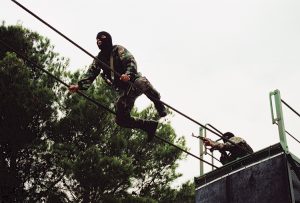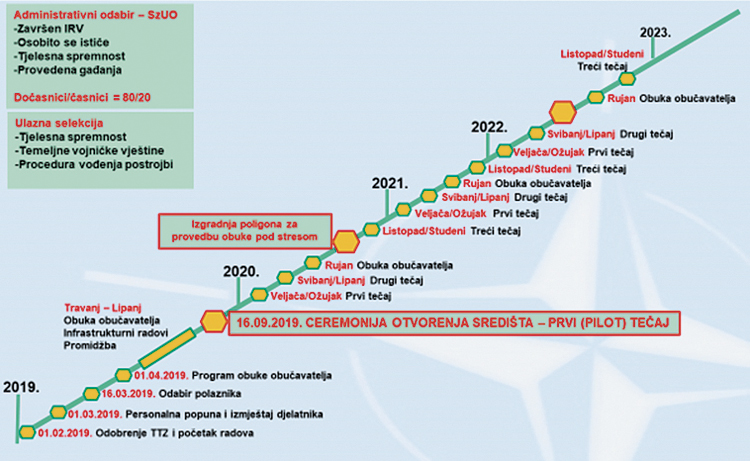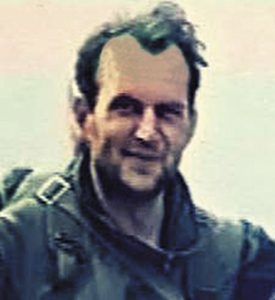As planned for the latter half of 2016, the Guards Motorised Brigade is tasked with…
The Most Intense Training in New Centre for Combat Leader Development
 Starting in mid-September, the Croatian Armed Forces are once again going to have a centre in which highly motivated, trained and competent leaders will be developed on the basis of the experience from the Homeland War and following the model of the Guard’s NCO Specialist Training Centre “Damir Tomljanović Gavran”. These new leaders will pass the knowledge and skills acquired at the training onto their units. They will serve as an example to their subordinates and as confidants to their superiors.
Starting in mid-September, the Croatian Armed Forces are once again going to have a centre in which highly motivated, trained and competent leaders will be developed on the basis of the experience from the Homeland War and following the model of the Guard’s NCO Specialist Training Centre “Damir Tomljanović Gavran”. These new leaders will pass the knowledge and skills acquired at the training onto their units. They will serve as an example to their subordinates and as confidants to their superiors.
The new Centre for Leader Development “Marko Babić” will be situated in Barracks “Josip Jović” in Udbina. This location was chosen because of its central position in the Republic of Croatia, good traffic connection and the vicinity of other training capacities: Training Range “Eugen Kvaternik” near Slunj and Training Range “Crvena zemlja” near Knin as well as Barracks “Lieutenant Colonel Mirko Vukušić” in Zemunik. The main factor in choosing Udbina as the location of the new centre was the fact that the terrain provides ideal conditions for conducting demanding training.
“Experience has shown that the most demanding types of training can be conducted in Udbina. The commando training, conducted by the Special Forces Command, has confirmed that. The location possesses the necessary infrastructure and amenities for the accommodation, life and work of the Centre’s members and trainees,” The Commander of the Croatian Army Major General Siniša Jurković says when explaining why Udbina was chosen as the place where the new generation of combat leaders will be developed.
Since Barracks “Josip Jović” has everything needed for the successful conduct of the course, the training conducted there will first and foremost rely on its infrastructure. However, the training will also be conducted on other locations, i.e. training ranges, drilling grounds and shooting ranges the infrastructure of which can support the fulfilment of training objectives. The main objective of the establishment of the Centre for Leader Development “Marko Babić” is the development and reinforcement of the capabilities of NCOs and officers in the Croatian Armed Forces. The training is intended for NCOs occupying various posts, from team leader and squad commander to Command Senior Enlisted Leader of a platoon or a company, as well as for officers who hold the office of a platoon commander. They will make use of the skills acquired at the training in their units.
 “The Croatian Armed Forces have developed Military Leadership Training, which is conducted with enlisted soldiers in order to prepare them for their first NCO duty. In training, they acquire the knowledge and the skills needed to successfully lead a team and a squad. Our wish for the Centre for Leader Development is for it to become another place where enlisted soldiers and other members of the Croatian Armed Forces occupying commanding posts on lower tactical levels will sharpen their skills of leading and commanding units. At the end of the course, they will pass the acquired knowledge and skills onto their colleagues,” General Jurković says. He adds that the training’s emphasis will be on developing the skills and the knowledge which must adorn a leader on any level. These qualities are critical thinking, problem solving, adaptability, creativity, resistance, ingenuity and flexibility, the Commander of the Croatian Army says.
“The Croatian Armed Forces have developed Military Leadership Training, which is conducted with enlisted soldiers in order to prepare them for their first NCO duty. In training, they acquire the knowledge and the skills needed to successfully lead a team and a squad. Our wish for the Centre for Leader Development is for it to become another place where enlisted soldiers and other members of the Croatian Armed Forces occupying commanding posts on lower tactical levels will sharpen their skills of leading and commanding units. At the end of the course, they will pass the acquired knowledge and skills onto their colleagues,” General Jurković says. He adds that the training’s emphasis will be on developing the skills and the knowledge which must adorn a leader on any level. These qualities are critical thinking, problem solving, adaptability, creativity, resistance, ingenuity and flexibility, the Commander of the Croatian Army says.
“The course is designed to shape a leader’s character as a commander and trainer,” general Jurković says.
The trainees must meet high mental and physical standards since the proposed programme involves training in all field and weather conditions. To be more precise, the training is conceived in such a way that the combat-focused elements of the training direct trainees, who to lead soldiers through situations that they might find themselves in later on.
“The emphasis will be on the development of skills and knowledge so that the process of leading units on a tactical level could be as efficient, good and successful as possible. A special emphasis will be laid on the functioning of the leader in difficult conditions and stressful situations. The training will be conducted 24/7 in all weather conditions,” General Jurković announces. He lists some of the elements of the training: navigation, firing from small arms in all conditions, tactical tasks, physical readiness, military psychology, andragogy, didactics, etc.
The training is five weeks long and is comprised of three phases. These phases are preceded by a selection, which is primarily administrative in nature. This means that potential candidates must meet standard criteria that are set for all other types of vocational specialization: medical fitness, formal evaluation, physical readiness and appropriate conduct. The administrative selection is followed by an entrance exam and the start of the course. However, it must be pointed out that the course retains its selective character throughout its duration.
“The candidate who does not meet the standards of a particular training segment will not be allowed to continue with the course. At the end of the course, we expect to have highly motivated and competent leaders in the Croatian Armed Forces who are trained for new challenges, who serve as an example to their subordinates and who are confidants to their superiors,” General Jurković clears up. The objective is for only the best ones to finish the training at the Centre for Leader Development. The first and the second phase will include contents such as leadership; small arms; protection and first aid; tactical training; transfer of forces; mines and explosive ordnances; survival; evasion; resistance and extrication; self-defence and physical training. The third phase is focused on administrative tasks; the discharge of weapons, equipment, gears and expedients; and the final ceremony, when certificates proving the successful completion of the training are given to the participants. The peak of the third phase will be a 72-hour long final exercise. The activities in the exercise will be conducted on operating points day and night. The trainees will pass a specified route in tactical conditions and will conduct tactical activities and a number of situational exercises on aforementioned operating points. The course will end with an infantry walk during which tactical tasks will be conducted, as was once the custom at the end of the training in the Guard’s NCO Specialist Training Centre “Damir Tomljanović Gavran”.
The comparison of the future Centre for Leader Development “Marko Babić” with its predecessor is unavoidable, so we ask General Jurković how the training processes in the new Centre will differ from the one that was once conducted in Šepurine.
 “The Guard’s NCO Specialist Training Centre “Damir Tomljanović Gavran” was an inspiration to us and a guiding principle in developing the Centre for Leader Development “Marko Babić”, which is intended to carry on the tradition and the spirit of the leader training that used to be conducted in Šepurine. Likewise, the Centre for Leader Development “Marko Babić” will be focused on developing leaders who will become the pillars of their units after completing the course. There will be some differences, since the Croatian Armed Forces are structured differently today. New standards have been adopted and we are equipped with new, more modern weaponry. The training must be adjusted to all of that accordingly,” the Commander of the Croatian Army explains.
“The Guard’s NCO Specialist Training Centre “Damir Tomljanović Gavran” was an inspiration to us and a guiding principle in developing the Centre for Leader Development “Marko Babić”, which is intended to carry on the tradition and the spirit of the leader training that used to be conducted in Šepurine. Likewise, the Centre for Leader Development “Marko Babić” will be focused on developing leaders who will become the pillars of their units after completing the course. There will be some differences, since the Croatian Armed Forces are structured differently today. New standards have been adopted and we are equipped with new, more modern weaponry. The training must be adjusted to all of that accordingly,” the Commander of the Croatian Army explains.
The initial selection of potential candidates is currently underway. Once the entrance selection is completed, 60 members of the Croatia Armed Forces will begin with the pilot training. Afterwards, three rotations, i.e. three courses a year are planned. The Centre will not only include a commanding, planning and supporting element, but also a coaching element. This element will include four training teams, each of which will be made up of two senior instructors and two other instructors who will conduct the course. At the moment, the Centre is being set up, vacancies are being filled and material resources are being procured. The housing and working spaces are being constructed and the training of the instructors is also being planned.
“The base for the selection of instructors is the Croatian Army. We have chosen the best instructors from all training centres and other units of the Croatian Army. In March, we are going to fill vacancies in accordance with the plans for the structure of the personnel and begin with the instructors’ training, i.e. we are going to prepare instructors for conducting the course,” General Jurković says. It has been announced that the first joint line-up of the employees and trainees of the Centre for Leader Development is planned for 16th September, when the flag will be raised at a ceremony in Barracks “Josip Jović” in Udbina. Badges and diplomas will be handed out on the Knin Fortress, where the best participant will also receive an award. It is interesting to note that the employees and the trainees of the Centre for Leader Development are expected to arrive to the ceremony on foot from Udbina, which is 100 kilometres away. As far as the opening of the Centre is concerned, General Jurković says that there is nothing that could slow down the realization of their plan.
The training process will promote positive competitive spirit and the strengthening of unity as well as the values of patriotism, belonging, loyalty, obligation, respect, selflessness, honour and bravery. So as to increase the dynamics and develop positive competitive spirit among the trainees, individual results in every part of the training will be monitored. All trainees will go through a final evaluation. The objective is for the most successful ones to be singled out and rewarded at the end of the process.
 The first rotation will include only trainees from the Croatian Army. However, it is not excluded that soldiers from partner countries’ armed forces might become involved with the training in Udbina in the future.
The first rotation will include only trainees from the Croatian Army. However, it is not excluded that soldiers from partner countries’ armed forces might become involved with the training in Udbina in the future.
“The Republic of Croatia is a member of NATO and numerous regional initiatives. The conduct of joint trainings and courses with the members of partner countries’ armed forces is only natural for us. We are open to the idea of partner countries and allies’ armed forces participating in the leader development course. I believe that their participation would improve the profile of the Croatian Armed Forces as a leader in south-east Europe and improve the quality of the course,” General Jurković concludes.
The future Centre for Leader Development is being developed at the initiative of Deputy Prime Minister and Defence Minister Damir Krstičević. It is modelled on its predecessor, the Guard’s NCO Specialist Training Centre, which was established at the initiative of Lieutenant General Ante Gotovina in April 1994. After the end of Operation Maslenica, which reconnected the Croatian north and south, the good and bad sides of the Croatian Armed Forces were analysed. One of the conclusions was that the NCO forces were insufficiently educated. Knowing how important it was to have a well-trained NCO, who is a link between the commander and the enlisted soldiers and who uses their knowledge and experience to supervise young soldiers, the Guard’s NCO Specialist Training Centre in Šepurine was established. The intense and demanding training was conducted under the motto “Sweat spares blood.” About 80 trainees gathered at the first training. The first commander of the Guard’s NCO Specialist Training Centre in Šepurine was Werner Ilić from the 4th Guards Brigade. Our soldiers’ subsequent victories on the battlefield demonstrated that such a centre played an important role in the Croatian side prevailing in the final operations of the Homeland War. The Guard’s NCO Specialist Training Centre in Šepurine existed until 2000, when it ceased operations. The barracks near Zadar were put out of action and handed over to the Agency for State Property Management in September 2011.
The Guard’s NCO Specialist Training Centre in Šepurine played an important role in the development of the victorious spirit in the Croatian Armed Forces during the war and after it. Nurturing that tradition has been the guiding principle in the establishment of the new training centre.
“The Croatian Armed Forces were formed in the Homeland War. Everything we do today has its foundations in the victories of the Croatian Armed Forces in the Homeland War. The Guard’s NCO Specialist Training Centre “Damir Tomljanović Gavran” in Šepurine was an important part of the victorious Croatian Armed Forces. The Centre for Leader Development “Marko Babić” is founded on traditional values and as such has significance for the Croatian Armed Forces. Highly motivated and competent leaders will be trained there. They will be the pillars of their units and they will pass the knowledge and the skills acquired at the course onto their colleagues, both those under them and those above them in rank. The Centre for Leader Development is important for the Croatian Armed Forces because of its contribution to the improvement of the quality of leading and commanding. We are aware that we cannot successfully execute our tasks if we do not have good leaders and commanders on all levels. The Centre for Leader Development “Marko Babić” is essential for the Croatian Armed Forces because it will nurture its victorious tradition from the Homeland War and improve the quality of leading and commanding on all levels,” General Jurković closes off.
 Hero of Defence on Trpinj Road
Hero of Defence on Trpinj Road
While the Guard’s NCO Specialist Training Centre was named after the legendary member of the 1st Guards Brigade Tigrovi (Tigers) Damir Tomljanović Gavran, the future Centre for Leader Development will carry the name of another hero of the Homeland War – Marko Babić, the Deputy Commander of the 3rd Battalion of the 204th Vukovar Brigade. After the death of the legendary commander of Borovo naselje’s defence Blago Zadro, Babić assumed his position. He and his fellow fighters destroyed 14 enemy tanks on the Trpinj road, where they successfully repelled the Yugoslav People’s Army’s attacks until the final days of the Battle of Vukovar.
After Vukovar’s defence was broken, he continued fighting on other battlefields in the Homeland War. His parents, along with about 15 other people, were taken captive on 14th September 1991 and murdered in Trpinja, near Vukovar. He turned down President Franjo Tuđman’s offer to go into early retirement and stayed with the Croatian Armed Forces until 1997. Afterwards, he produced Croatian Radiotelevision’s documentary series “Heroes of Vukovar”. Sadly, he did not live to see its broadcast; he died of a stroke on 5th July 2007 and was buried at the Memorial Cemetery of the Victims of Homeland War in Vukovar.
Text by MARTINA BUTORAC
Photo by ARCHIVE OF THE CROATIAN MILITARY PRESS AND PUBLICATIONS DEPARTMENT
Translation by IVA GUGO
